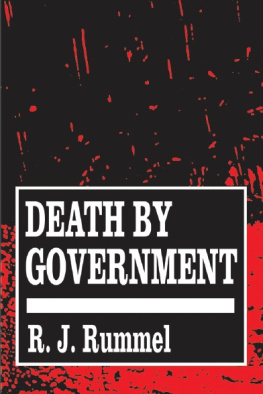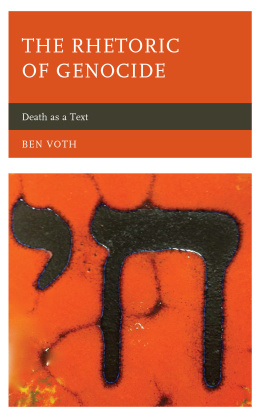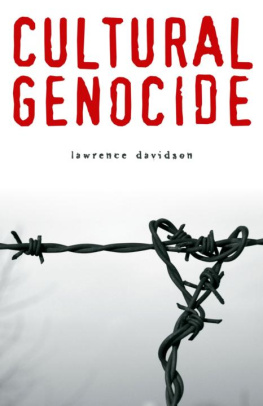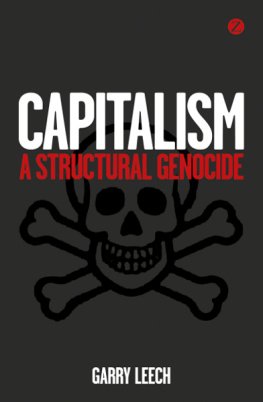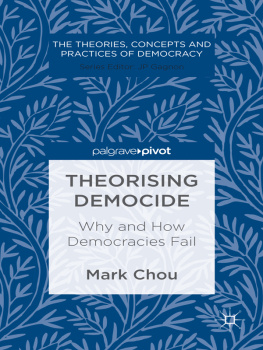

Copyright 1994 by Transaction Publishers, New Brunswick, New Jersey.
All rights reserved under International and Pan-American Copyright Conventions. No part of this book may be reproduced or transmitted in any form or by any means, electronic or mechanical, including photocopy, recording, or any information storage and retrieval system, without prior permission in writing from the publisher. All inquiries should be addressed to Transaction Publishers, 10 Corporate Place South, Piscataway, NJ 08854. www.transactionpub.com
This book is printed on acid-free paper that meets the American National Standard for Permanence of Paper for Printed Library Materials.
Library of Congress Catalog Number: 93-21279
ISBN: 978-1-56000-145-4 (cloth); 978-1-56000-927-6 (paper)
Printed in the United States of America
Library of Congress Cataloging-in-Publication Data
Rummel, R. J. (Rudolph J.), 1932
Death by government / R. J. Rummel.
p. cm.
Includes bibliographical references (p. ) and index.
ISBN 1-56000-927-6
1. GenocideHistory20th century. 2. ViolenceHistory20th century.
| HV6322.7.R86 1994 | 93-21279 |
| 364.1510904dc20 | CIP |
Foreword
It has often and properly been bemoaned, by its champions and critics alike, that the social sciences, unlike the physical sciences, do not travel. By that I presume is meant that they lack an absence of universal properties that would permit an observer in one place to readily identify the parameters of research and findings in anther place halfway around the world. Indeed, if such parochialism is endemic to the nature of the social sciences, then the very notion of science as social is itself in dispute.
However there is one great and noble exception to this complaint (I should qualify this by saying that there may be others as well for example the work done in experimental psychology) in the realm of large-scale analysis of whole societies: Namely, the study of life and death and the forms of inflicted nasty behaviors in between. For, in the measurement of life-taking propensities of states, societies, and communities, we come upon the universal property that links all humankind.
In this small world of specialized researchers on the arbitrary foreclosure and termination of human life, national boundaries and linguistic differences among the social scientists seem magically to melt. We have social historian Alex P. Schmid in the Netherlands and his work on the politics of pain and punishment; famed psychologist Herbert C. Kelman from the United States and his studies of crimes of obedience and authority; Mika Haritos-Fatouros, also a psychologist, in Greece working on the psychology of torture; Israel W. Charny in Israel amassing worldwide studies of comparative genocides with a special emphasis on holocausts directed at the Jewish and Armenian peoples. To be sure, this is a small universe of shared information about the terrible aspects of the large universe.
These names are more illustrative than exhaustive. One might just as well mention scholars of equal rank in Canada, Japan, England, France, and Germany, also hard at work on similar and related subjects. The key is not disciplinary or national boundaries but the human subject write large the taking of life, the maiming of life, the deformation of life not as a morbid preoccupation but as a mechanism by which social science can join the pure and applied fields of science and medicine to heal and repair and, ultimately, to just leave alone! For those who work in this area have as a common bond a recognition that issues of life and death are critical to social research, and that the prolongation of life and the postponement of death is a common meeting ground not just for people of good will but for researchers of good research habit.
In this specialized world at which the grim side of the twentieth century is explored in depth and with a special poignancy that often defies words but does not escape numbers none stand taller than R.J. Rummel, political scientist at the University of Hawaii. He has brought to the study of genocide a quantitative range of figures that is truly staggering by any measurement, and the qualitative meaning of all these numbers in the study of the comparative worth of civilizations.
What Rummel has done in this book above all others is provide a conceptual map to make future studies easier. He has made the sort of hard distinctions that are data-driven between legal and outlaw states; between genocide and democide, between democratic and authoritarian systems all anchored firmly in numbers. To be sure, numbers matter. All societies are in their nature imperfect artifacts. But those that hold as their highest value the sanctity of the person are different in their nature and essence from those who see their ultimate mission as obedience and punishment for the transgressors. This easy movement of different types of social scientists converging on the problem of life and death is fueled by the sort of data provided ad distinctions made by Rummel. Indeed, we can no longer work in this area without reference to this massive yet singular effort.
Just prior to the publication of Death by Government I wrote to Professor Rummel to express my appreciation for his effort, mentioning that subsequent editions of my own work in the 1970s in this area, summed up in Taking Lives, were not needed thanks largely to his own extraordinary efforts. I suspect that it is a rare and exhilarating feeling to be able to paraphrase Weber and declare: What I fail to make, others will, and then have this come true in ones own lifetime. To be sure, in my own most recent effort, an essay, Counting Bodies, it was the spirit of Rummels work that permitted me to better understand the wellsprings of Nazism, as well as the source of Jewish survival.
Rummels work needs no elaboration. But I would like to point to one crucial aspect that stands out above all others: the need to revise our sense of the depth of the horrors committed by communist regimes on ordinary humanity, the numbers are so grotesque at this level that we must actually revise our sense and sensibilities about the comparative study of totalitarianisms to appreciate that of the two supreme systemic horrors of the century, the communist regimes hold a measurable edge over the fascist regimes in their life-taking propensities. For, buried in the datum on totalitarian death mills as a whole is the terrible sense that communism is not Left and fascism is not Right both are horrors and the former, by virtue of its capacity for destroying more of its own nationals, holds an unenviable lead over the latter in life taking.
One might argue that the fascists had a greater sense of technological modes of destruction, but the communists utilized the natural hardships of life the better to destroy individual capacities for survival. Thus, those for whom the technology of death remains central may still prefer to think of the Nazis as worse offenders, whereas those for whom an elaborate prison system is forever enshrined as the Gulag by Solzhenitsyn will see the communists as worse offenders. But it is the wisdom of Rummel to urge us beyond such dubious honors into an appreciation of the linkages of totalitarian systems in the murderous pursuit of worthless objectives.
Professor Rummel rarely speaks about morality and virtue. His concerns are not fixated on normative concerns of equity and liberty, or the uneven rankings of people in societies. He is not describing the imperfections of democracies or the weakness of Western liberalism. Rather, he is by implication saying that societies in which debate and discussion do not lead to death and decimation will somehow find a means to care for themselves. In that sense, his trilogy
Next page
